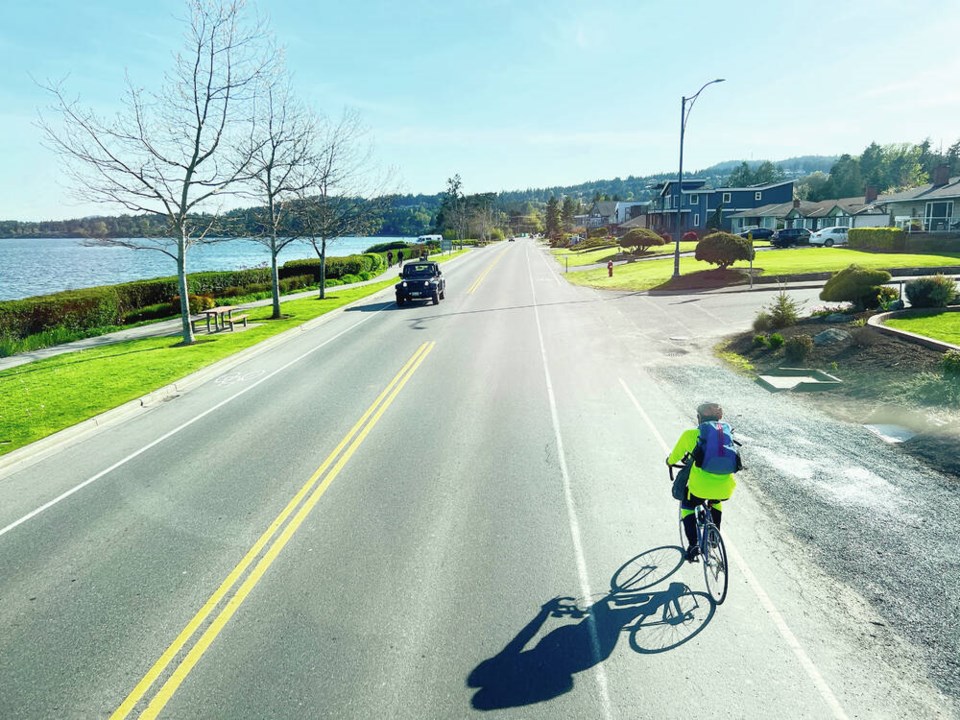A commentary by a Vancouver Island writer and editor.
With the cycling deaths of beloved hockey star Johnny Gaudreau and his brother from being hit by a driver trying to overtake a couple of other vehicles, I’m hoping that the tragedy will be used to launch a major educational campaign to help prevent such accidents in the future.
As someone who has cycled extensively in the United States, Canada, Europe and Southeast Asia, I know from my own experiences how aggressive drivers can be when cyclists are around.
I’ve personally had so many near misses that I can’t remember them all. A few, however, are embedded in my mind, and those memories sometimes haunt me and anger me to this day:
• School bus drivers in Silver City, New Mexico, who seemed to deliberately squeeze me on the shoulder of the road. (The same thing happened in San Diego. Why school buses? I can only guess that it’s because of part-time drivers in a rush to end their day.)
• A semi-truck, also in New Mexico, who did a slow motion move to crush me against a raised concrete shoulder curb. I still can’t imagine what was going through his mind as he did this. I was clearly visible and already far off the highway when he drifted toward me. If I hadn’t gotten off my bike and fled behind a lamppost in this slow-motion fracas, I would have been killed.
• Luxury SUV drivers in Luxembourg who were aggressive, fast and dangerous.
• Pickup truck drivers in Alabama throwing stuff as they drove by, yelling, with their dogs sometimes stretching out over the rails of their truck beds in an attempt to bite us as they passed.
• More pickup drivers pulling on to the shoulder in front of and lugging their engines, videoing as black smoke was blown our way. (Sometimes drivers would loop back again to reshoot the video, to get it juuuust right.)
• And on and on and on.
We learned that the most dangerous time to cycle was during the evening commute. Friday afternoon happy hour was the worst. Deadly and dangerous. Booze-fuelled drivers sharing the road with impatient commuters, taking enormous risks, passing each other on blind corners, double lines and cyclists be damned.
The odd thing is roads have become far more dangerous over the years.
People are far more impatient, they seem to be far more distracted. And, in my opinion, with driving larger and larger cars with more efficient safety systems, people seem to be driving more recklessly.
And this is not just an American thing.
We have seen our share of bike vs. car tragedies in Victoria.
I was also dismayed over the weekend to see that a sixth cyclist fatality had occurred in Toronto, more than the city’s combined number of cyclist deaths from 2021 to 2023.
Cycling advocates were already calling the Toronto situation a crisis before the latest death there occurred.
Which brings me back to the awful collision involving the Gaudreau brothers.
To be sure, their deaths are an agonizing, senseless tragedy.
While the loss of Johnny Gaudreau and his brother is a personal tragedy, it is also a stark reminder of the broader dangers cyclists face on our roads every day. With about 850 cyclist fatalities annually in the United States and between 40 to 75 such deaths occurring each year in Canada, it’s clear that the issue is not isolated to one region. These numbers represent lives cut short, families shattered, and communities left grieving.
It’s imperative that we seize this moment to push for change. The deaths of the Gaudreau brothers could serve as a catalyst for a nationwide educational campaign aimed at making our roads safer for everyone.
By raising awareness, encouraging empathy, and promoting responsible driving, we can help prevent future tragedies and honour the memories of those we’ve lost.
Let’s turn this grief into action. It’s time for a concerted effort to ensure that no more lives are needlessly lost on our roads.
>>> To comment on this article, write a letter to the editor: [email protected]



